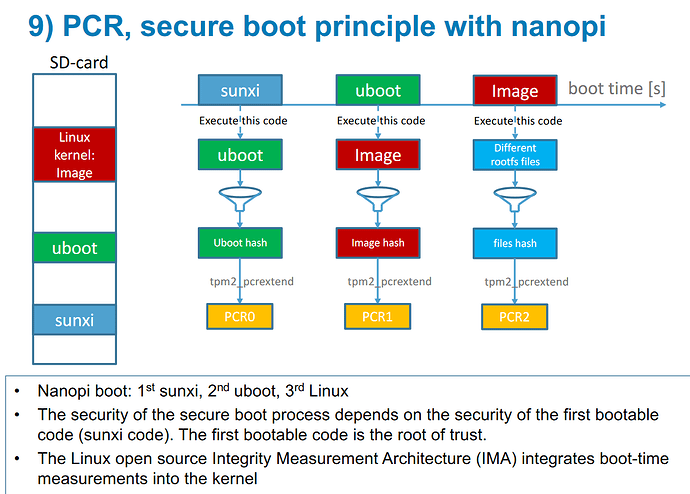Hi,
Thank you again for the answer !
I now understand what the problem is, i am sorry in my mind it was “juste” some I2C communication between this chip and my Linux system and I didn’t think about drivers.
I don’t know if it changes something, but i am using the image :
imx8mm-Tezi_6.4.0+build.5
I did some research on the net and found this :
OPTIGA™ TPM User Guide
OPTIGA™ TPM SLx 967y TPM2.0 on Raspberry Pi® 4 QuickStarter User Guide
This document explains how the OPTIGA™ TPM SLx 967y TPM2.0 can be used on a Raspberry Pi® 4. The same setup also
works and has been tested on a Raspberry Pi® 3. However, in this document we refer to “Raspberry Pi® 4”. The Linux®
kernel described in this document is version 5.15 (the latest kernel in Raspberry Pi® OS) as well as version 6.0 (the latest
upstream kernel). These kernels have integrated TPM 2.0 driver support, which simplifies TPM setup with the Raspberry
Pi® 4. This Application Note shows how fast and simple the TPM 2.0 setup is, even with basic Linux® knowledge.
and at page 9/46:
Optiga™ TPM SLB 9672 and SLB 9673 RPi Evaluation Boards
Insert the flashed SD card and boot the Raspberry Pi® 4. The driver should be automatically loaded and configured.
After boot, you can check for the existence of /dev/tpm0 and /dev/tpmrm0:
1 ls -l /dev/tpm*
During the boot process the Linux® kernel is configured using the device tree information of the device how the host
CPU and all its peripherals are connected. These device tree information is static for the basic board, but can also be
extended using so-called device tree overlays. The Optiga™ TPM SLB967y RPi Evaluation boards contain an EEPROM
chip that contain these device tree overlays. The Raspberry Pi® OS Linux® kernel is configured in such a way, that it reads out the EEPROM auf such boards and applies the configuration automatically.
Note: on older Optiga™ TPM SLx 9670 Iridium board, you need to manually enable the driver. After flashing, remove and reinsert the SD card into your PC.
Edit the file config.txt from the FAT32 partition labeled boot. Add the following
line to the [all] section: 1 dtoverlay=tpm-slb9670
Link : https://www.infineon.com/dgdl/Infineon-Optiga_TPM_RPi_Quickstarter_User_Guide-UserManual-v01_00-EN.pdf?fileId=8ac78c8c8e7ead30018ee5a4d85b04bd&da=t
So reading this, I understand that you have to modify your device tree to make the TPM work with kernel 5.15.xx ?
I will open a ticket with Infineon to try to find a solution.
Do you have a release date for the kernel 6.xx on the verdin imx8m-mini ?
I will take a moment to read about Toradex’s security workflow. Thank you !
Thank you for all the answers, i really appreciate it.
Best regards
![]()
